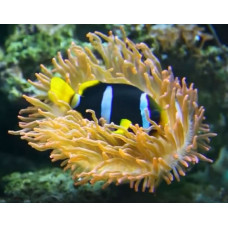Latin name
Amphiprion clarkii
Other name
Yellowtail clownfish
Identification
The body of the Clark's anemonefish is oval, compressed at the sides, with a lateral line.
Features of fish fins
Dorsal spines (total): 10; Dorsal soft rays (total): 15 - 16; Anal spines: 2; Anal soft rays: 13 - 14.
Fish colouring
A colourful fish with bright black, white and yellow stripes. The fish usually has two white stripes, one behind the eye and one in front of the anus. The tail is white or yellow.
Distribution
It has the widest distribution of any anemonefish. It lives in south-east Asia, from the coast of northern Australia to southern Japan, from Melanesia to the northern seas of the Indian Ocean and the Persian Gulf. Its wide distribution is due to its long planktonic larval stage, during which the larvae are carried long distances by ocean currents.
Habitat
A marine tropical species. Inhabits coral reefs. Does not migrate. Depths from 1 to 70 metres.
Size
The body length of these fish is up to 15 cm. Maximum reported age: 11 years.
Behavior
Adults live in lagoons and on the outer slopes of reefs. The species lives in symbiosis with 10 species of actinia: Cryptodendrum adhaesivum, Entacmaea quadricolor, Heteractis aurora, Heteractis crispa, Heteractis magnifica, Heteractis malu, Macrodactyla doreensis, Stichodactyla gigantea, Stichodactyla haddoni and Stichodactyla mertensii.
Food and feeding habits
Omnivores.
Reproduction
Spawning in the benthos. Sex change occurs in less than 5-6 months. Egg-laying, elliptical eggs. Monogamous. Mates during reproduction. Eggs are on the bottom and adhere to the substrate. Males guard and aerate eggs.
Fishing
Fished naturally for sale to aquariums.
Relationship with a person
Harmless.
| Classification | |
| Phylum | Chordata |
| Class | Actinopterygii |
| Family | Pomacentridae |
| Genus | Amphiprion |
| Species | A. clarkii |
| Features | |
| Conservation status | Least Concern |
| Habitat | Pelagic |
| Life span, years | 11 |
| Maximum body weight, kg | No information |
| Maximum length, cm | 15 |
| Sailing speed, m/s | No information |
| Threat to people | Not edible |
| Way of eating | Planktonophage |
Clark's anemonefish
Tags: clarks anemonefish


